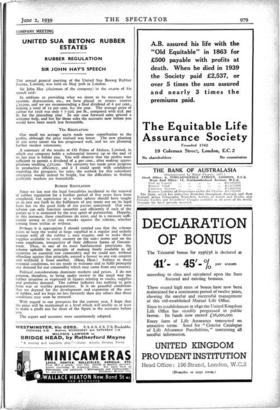COMPANY MEETING
UNITED SUA BETONG RUBBER ESTATES
RUBBER REGULATION SIR JOHN HAY'S SPEECH
THE annual general meeting of the United Sua Betong Rubber Estates, Limited, was held on May 30th in London.
Sir John Hay (chairman of the company) in the coarse of his speech said:
In addition to providing what we deem to be necessary for taxation. depreciation, etc., we have placed to estates reserve k30,000, and we are recommending a final dividend of 6 per cent., making a total of 12 per cent. for the year. The average price of rubber for 1938 was only 7 7-32d. per lb., compared with 91c1. per lb. for the preceding year. In our case forward sales proved a welcome help, and but for those sales the accounts now before you would have been much less favourable.
TEA REGULATION
Our small tea acreage again made some contribution to the profits, although the price realised was lower. The new planting of 500 acres unaer tea has progressed well, and we are planning further modest extensions.
A summary of the results of Oil Palms of Malaya, Limited, in which our company holds a substantial interest up to the end of its last year is before you. You will observe that the profits were sufficient to permit a dividend of 4 per cent., after making appro- priations totalling £27,000. The company has made great progress in productive efficiency, and if I could speak with confidence regarding the prospects for sales, the outlook for this subsidiary enterprise would indeed be bright, but the difficulties in finding profitable markets are formidable.
RUBBER REGULATION
Since we last met the legal formalities incidental to the renewal of rubber regulation for a further period of five years have been completed, but experience in a wider sphere should have taught us to rest our faith in the fulfilment of any treaty not on its legal basis but on the good faith of the parties concerned. Our own scheme can only function smoothly and efficiently if each of the parties to it is animated by the true spirit of partnership. Happily, in this instance, these conditions do exist, and in a measure suffi- ciently strong to r:7e.1 any attacks against the scheme, whether coming from within or without.
Perhaps it is appropriate I should remind you that the scheme exists to keep the world at large supplied in a regular and orderly manner with all the rubber ii may require, and to make these supplies available to every country on the sam! terms and on the same conditions, irrespective of their different forms of Govern- ment. Thus, in one of its most fundamental provisions the scheme upholds the principle of making freely available to all countries an essential raw commodity and we could not, without offending against that principle, extend a favour to any one country and withhold it from another. (Hear, Hear.) Subject to these essential conditions, we are ready to welcome and to fulfil promptly any demand for our commodity which may come from any country.
Political considerations dominate markets and prices. I do not propose, therefore, to bring under review in the usual way the rubber situation as expressed in figures relating to stocks, supplies and probable demand. The rubber industry has nothing to gain from war or warlike preparations. It is on peaceful conditions that we depend for the development and expansion of the uses of rubber, and we hope no less fervently than any others that these conditions may soon be restored.
With regard to our prospects for the current year, I hope that the price will be maintained at a level which will enable us at least to make a profit not far short of the figure in the accounts before you.
The report and accounts were unanimously adopted.










































 Previous page
Previous page